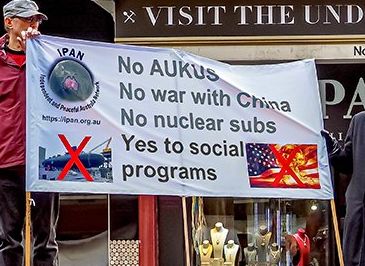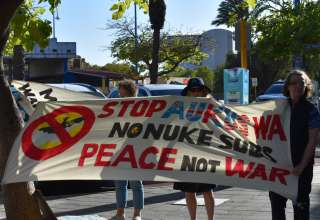by Bevan Ramsden
Neutrality offers Australia a foreign policy alternative which would keep us out of a U.S.-China war. Although this position is favoured by over two thirds of Australians, the presence of U.S. military bases on our soil and the government’s embrace of the AUKUS pact, block its adoption.
Non-nuclear armed neutrality is the basis of an alternative defence policy for Australia proposed by the Independent and Peaceful Australia Network (IPAN). In that policy diplomacy is emphasized as the first line of defence in all situations. The ADF is confined to a true self-defence of Australian territory and its surrounding waters out to the 200 nautical mile exclusive economic zone. There would be no involvement in foreign wars of aggression and overseas deployment of our ADF would be restricted to joining United Nations peace keeping forces in appropriate circumstances.
Such a policy of territorial defence would be far less expensive than Australia’s current focus on preparing for overseas wars, against China, for example, in close integration with the United States and its other allies. Defence analysts now say that recent technological advances such as those involving drones and remote sensing have made territorial self-defence based on area denial a much cheaper option than forward expeditionary, aggressive wars in distant locations. Current defence policy has Australia poised to increase spending on war preparations to 2.4% of GDP by 2034. The AUKUS expenditure of $368 billion on nuclear propelled hunter-killer submarines being only part of it. Defence Minister Marles has no trouble finding billions of dollars for hypersonic missile development and for equipping our frigates with Tomahawk cruise missiles designed for use against land-based targets whilst the country is crying out for affordable housing, improved health care and urgent attention to addressing the climate crisis/emergency.
IPAN’s alternative defence policy based on neutrality has found support in the Australian community and deserves serious discussion. Two national opinion polls, conducted in 2023 by the Lowy Institute and Essential Research, have found that a majority of Australians are in favour of keeping out of a U.S. war against China and adopting a neutral position. The Lowy poll showed that 73 % of Australian women favour this position.
So what exactly is neutrality and how would it work?
IPAN representative Bevan Ramsden recently attended the Congress on Neutrality in Colombia organized by World beyond War and the International Peace Bureau. He gave a speech which can be accessed here. The Congress was attended by 50 speakers from 25 countries on 5 continents. Its call was for the world to unite for neutrality and peace and adopt a strategy to stabilise our planet and build a future where war is a relic of the past.
20 countries have adopted a neutrality policy.
Austria, for example, practises non-aligned neutrality. It does not host foreign military forces or bases but has its own self-defence force. It does not participate in foreign wars and has no military alliances. Its parliament adopted the neutrality law which has become part of its constitution. It hosts international meetings, has banned nuclear weapons and played a part in Central Europe becoming nuclear free. The Congress speaker for Austria was Dr Heinz Gartner, Academic Director, Austrian Institute for International Affairs. He said that: “Austria made neutrality, “fashionable” “credible” and “acceptable”. He also said: “Neutrality avoids entanglement in Great Power wars”. It also gives a neutral state the credibility to act as a buffer state, promote peace keeping, host meetings between belligerents and act as a mediator.
This is an example of active neutrality, unlikethat of Switzerland which adopted an isolationist approach until more recently when it joined the United Nations in 2002 and participated in UN peace-keeping forces from 1990.
The Austrian approach is of interest to Australia because it shows how we could play a constructive role in our region and beyond in promotion of peaceful resolution to conflict.
What is preventing Australia adopting a foreign policy based on neutrality, in line with the wishes of the majority of Australians?
The basic problem is that Australia’s political leadership has been totally captured by the U.S. and slavishly follows U.S. foreign policy through the ANZUS Alliance and more recently the AUKUS war pact between the U.K., the U.S. and Australia. Internally, this subservience to the U.S. is expressed through the wholesale sellout of sovereignty resulting from the Force Posture Agreement signed by the U.S. and Australian governments in 2014. The FPA guarantees the United States a military posture in Australia. It gives the United States military unimpeded access to our airports and sea-ports. This includes porting of their nuclear submarines at HMAS Stirling in WA and basing of their nuclear-capable B52 bombers at RAAF Tindal in the NT. It facilitates the stationing in Darwin of 2,500 U.S. marines each year and the staging of military exercises with our ADF in preparation for war against China. The U.S. has also established its own Command Centres in Darwin, for its airforce and marines.
Then there’s the Pine Gap spy station near Alice Springs, which feeds the U.S. military strategic information from its satellite surveillance of the earth’s surface and its capture and analysis of radio communications including that from mobile phones. Professor Richard Tanter, an expert on the expanded role of Pine Gap, recently stated that the strategic information which Pine Gap supplies to the U.S. is passed on to the Israeli military for use in its war of genocide against the people of Gaza.
Clearly neutrality is not an option until our continent is cleared of foreign military installations. This is the message to the Australian people. Only a massive, broad-based united public effort can clear the ground for the adoption of a political solution which will keep us safe and out of foreign wars, namely non-nuclear, armed neutrality.







